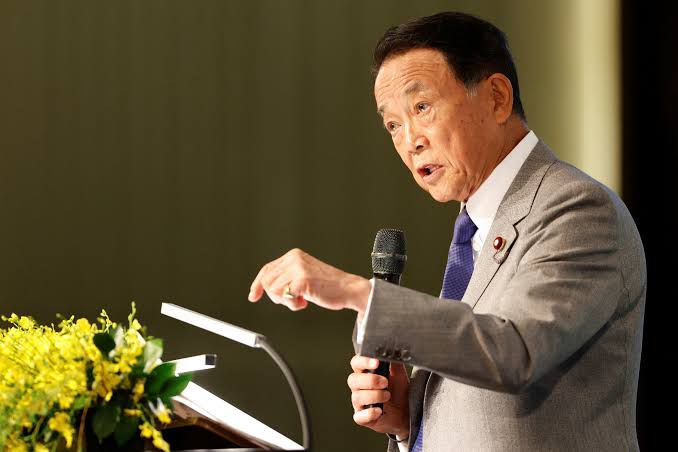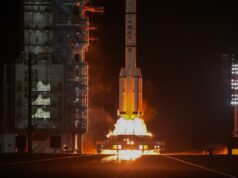Ex-Japan PM says Japan, US must resolve to fight for Taiwan

Former Japanese Prime Minister Taro Aso, currently vice president of the ruling Liberal Democratic Party, makes a speech at an international forum in Taipei, Taiwan, on Aug. 8, 2023. (Kyodo)
Former Japanese Prime Minister Taro Aso called Tuesday for a posture of strong deterrence to ensure peace and stability in the Taiwan Strait, saying that Japan, the United States and Taiwan need to “resolve to fight” to deter possible attacks amid China’s increasing military pressure on the island.
At a regional security conference in Taipei, Aso asserted that maintaining peace and stability in the strait is crucial for Japan and the international community. He emphasized, “The foremost priority is to prevent war in this region, including the Taiwan Strait.”
To achieve this, Aso stated that Taiwan, Japan, and their allies need a deterrent, which he defined as defense capabilities, the will to utilize them if required and public consensus supporting their use. He added that it’s crucial to communicate these defense capabilities and intentions to potential adversaries.
“There has never been a time like now when Japan, Taiwan, the United States and like-minded countries need to resolve to put into action a strong deterrence. This is a resolve to fight,” Aso, who currently serves as vice president of Japan’s ruling Liberal Democratic Party, said at the forum.
He explained Taiwan’s situation has reached a more critical level since China carried out large-scale military drills around the self-ruled democratic island in response to a visit by then U.S. House of Representatives Speaker Nancy Pelosi in August last year.
The military exercises included the firing of ballistic missiles that fell into Taiwan’s surrounding waters, including Japan’s exclusive economic zone, he said.
With Taiwan slated to hold its presidential election in January next year, Aso expressed hope that the next president will be determined to maintain the island’s current status and fight together with Japan, stressing Japan’s defense capabilities, which Prime Minister Fumio Kishida has decided to bolster.
The incumbent president, Tsai Ing-wen, is ineligible for a third term.
Later in the day, Aso met with Tsai. The 82-year-old former Japanese leader told reporters he asked her to “raise a next leader,” urging the island to choose a “decent” president in the upcoming election.
If the successful candidate “suddenly shakes hands with China to secure business profits, the presence of Taiwan will be in danger,” Aso said.
In the talks with Tsai, Aso expressed his willingness to play a role in strengthening Japan-Taiwan ties. “When friends are in trouble, they can lend a helping hand to each other,” he said.
Referring to the popular Japanese manga series “One Piece,” Aso said the protagonist, Monkey D. Luffy, never betrayed his friends and used it as a metaphor to describe the flourishing relationship between Japan and Taiwan.
In a separate meeting with Taiwan Vice President Lai Ching-te, a key candidate in the upcoming presidential election, Aso noted tensions have been rising in the Taiwan Strait as it is “threatened by Chinese expansionism,” according to the Taiwan presidential office.
Aso also voiced concern about the possible evacuation of around 20,400 Japanese nationals living in Taiwan if the region becomes unstable, local reports said.
Lai said Taiwan will jointly safeguard the peace and stability of the Indo-Pacific region with Japan, the United States and other democratic countries, the presidential office said.
Aso is the highest-ranking LDP member to visit Taiwan since Tokyo switched diplomatic ties from Taipei to Beijing in 1972, according to the party.
Commenting on Aso’s visit, China’s Foreign Ministry said Monday in a written response to Kyodo News that it “firmly opposes and strongly condemns” interference in the country’s internal affairs.
Communist-ruled China and Taiwan have been governed separately since they split in 1949 due to a civil war. Beijing regards the territory as a renegade province and intends to unite it with the mainland, by force if necessary.



